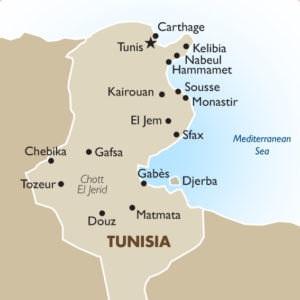 Population
Population
1948 105,000 | 2018 1,100
In 400 CE Jewish existed in Tunisia. Once they increased in number and prospered, persecution began. By 698 there was an influx of Spanish Jewish immigrants and Arab Jews. Jews experienced fluctuating fortunes over the next years.
By 1492 few Jews immigrate to Tunisia during the Spanish Inquisition because of the harsh treatment of Jews there and between 1535-1574 Spanish occupation of the Tunisian coasts caused major problems for some Jewish communities. 1772 brought some improvements in the treatment of the Jews due to European influences in Tunisia and by 1885, after two years of diplomatic negotiations with the French government, Jews were granted equal rights. In 1923, the new French laws made it easier for Tunisian Jews to obtain French citizenship. By Tunisian Independence in 1956 a third of the Tunisian Jewish Community held French citizenship.
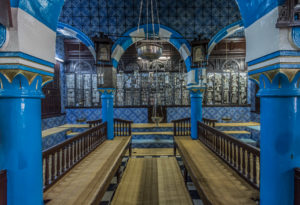 However, in 1940 Tunisia came under the rule of Vichy France and anti-Semitic laws were implemented, inspired by Nazi ideology. French and Muslim officials in Tunisia were sympathetic to the Jews, and were not enthusiastic about implementing the race laws. The Vichy governor of Tunisia, Admiral Jean-Pierre Estéva, delayed the implementation of the racist laws for a long time, benefitting the Jews. The German Nazi’s occupied Tunisia for six months between November 1942 and May 1943. 100,000 Jews lived in Tunisia at this time. More than 5,000 Jews were sent to labour camps, and 46 died there. Because of their distance from Europe, the Jews of Vichy Tunisia were spared the mass deportations and mass murder that happened in Europe. However, the Nazi’s required the Jews to wear a yellow Star of David.
However, in 1940 Tunisia came under the rule of Vichy France and anti-Semitic laws were implemented, inspired by Nazi ideology. French and Muslim officials in Tunisia were sympathetic to the Jews, and were not enthusiastic about implementing the race laws. The Vichy governor of Tunisia, Admiral Jean-Pierre Estéva, delayed the implementation of the racist laws for a long time, benefitting the Jews. The German Nazi’s occupied Tunisia for six months between November 1942 and May 1943. 100,000 Jews lived in Tunisia at this time. More than 5,000 Jews were sent to labour camps, and 46 died there. Because of their distance from Europe, the Jews of Vichy Tunisia were spared the mass deportations and mass murder that happened in Europe. However, the Nazi’s required the Jews to wear a yellow Star of David.
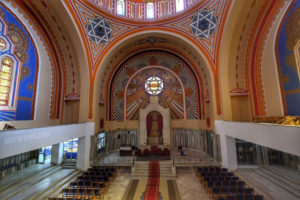 Fortunately, the Allied forces captured Tunisia: on May 6, 1943, the British took the capital city of Tunis, and American forces reached Bizerte. By May 13, 1943, the Axis forces in Tunisia had surrendered. This change in the fortunes of war was what serendipitously saved the Jews of Tunisia from a much different, and darker, fate. Though the Jews of Tunisia were saved from annihilation, they were subjected to harsh treatment by the returning French, who arrested and imprisoned dozens of Jews as collaborators. They were not released for several weeks.
Fortunately, the Allied forces captured Tunisia: on May 6, 1943, the British took the capital city of Tunis, and American forces reached Bizerte. By May 13, 1943, the Axis forces in Tunisia had surrendered. This change in the fortunes of war was what serendipitously saved the Jews of Tunisia from a much different, and darker, fate. Though the Jews of Tunisia were saved from annihilation, they were subjected to harsh treatment by the returning French, who arrested and imprisoned dozens of Jews as collaborators. They were not released for several weeks.
The creation of Israel in 1948 provoked a widespread anti-Zionist reaction in the Arab world, to which was added nationalist agitation, nationalization of enterprises, Arabization of education and part of the administration. Jews left Tunisia en masse from the 1950s onwards because of the problems raised and the hostile climate created by the Bizerte crisis in 1961 and the Six-Day War in 1967. By 1970, the majority of Tunisia’s Jewish population had left the country.
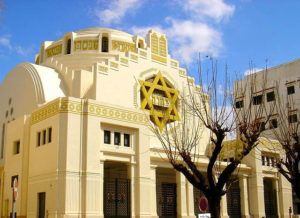 In recent years, Tunisia’s Jewish community has become a target for militant Islamists. In 2002, an al-Qaeda-affiliated suicide bomber crashed a truck loaded with explosives into Djerba’s Ghriba synagogue, killing, by some estimates, 19 people and wounding more than 30. To protect them, the Tunisian government has stationed police guards outside many Jewish institutions, to watch them around the clock.
In recent years, Tunisia’s Jewish community has become a target for militant Islamists. In 2002, an al-Qaeda-affiliated suicide bomber crashed a truck loaded with explosives into Djerba’s Ghriba synagogue, killing, by some estimates, 19 people and wounding more than 30. To protect them, the Tunisian government has stationed police guards outside many Jewish institutions, to watch them around the clock.
The Jewish population of Tunisia, estimated at about 105,000 individuals in 1948, numbered just 1,100 individuals as of 2018. Today the largest communities are in Tunis and in the island of Djerba. The Jewish community also has a small presence in the Tunis suburb of La Goulette. There are also approximately 200 Jews living in the Sousse-Monastir region on the Gulf of Hammamet. In Tunis, the Jewish community runs three primary schools and two secondary schools, while Djerba has a kindergarten, two primary schools and two secondary schools. There is also a Jewish primary school and synagogue in the coastal city of Zarzis. Tunisia’s first Jewish museum opened in 2012.
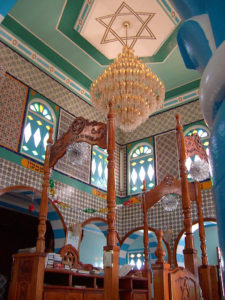 The most famous synagogue in Tunisia is the El Ghriba synagogue in the village of Hara Sghira on Djerba. The current building was constructed in late 19th or early 20th century, but the site is believed to have had a synagogue on it for the past 1,900 years. Tunisian Jews have for centuries made an annual pilgrimage to the synagogue on Lag Ba’Omer.
The most famous synagogue in Tunisia is the El Ghriba synagogue in the village of Hara Sghira on Djerba. The current building was constructed in late 19th or early 20th century, but the site is believed to have had a synagogue on it for the past 1,900 years. Tunisian Jews have for centuries made an annual pilgrimage to the synagogue on Lag Ba’Omer.
On the island of Djerba off the coast of Tunisia, a small community of Jews lives. Most of the men make a living as merchants of jewellery. In the center of the Islan is the El Ghriba synagogue, the oldest in Africa.